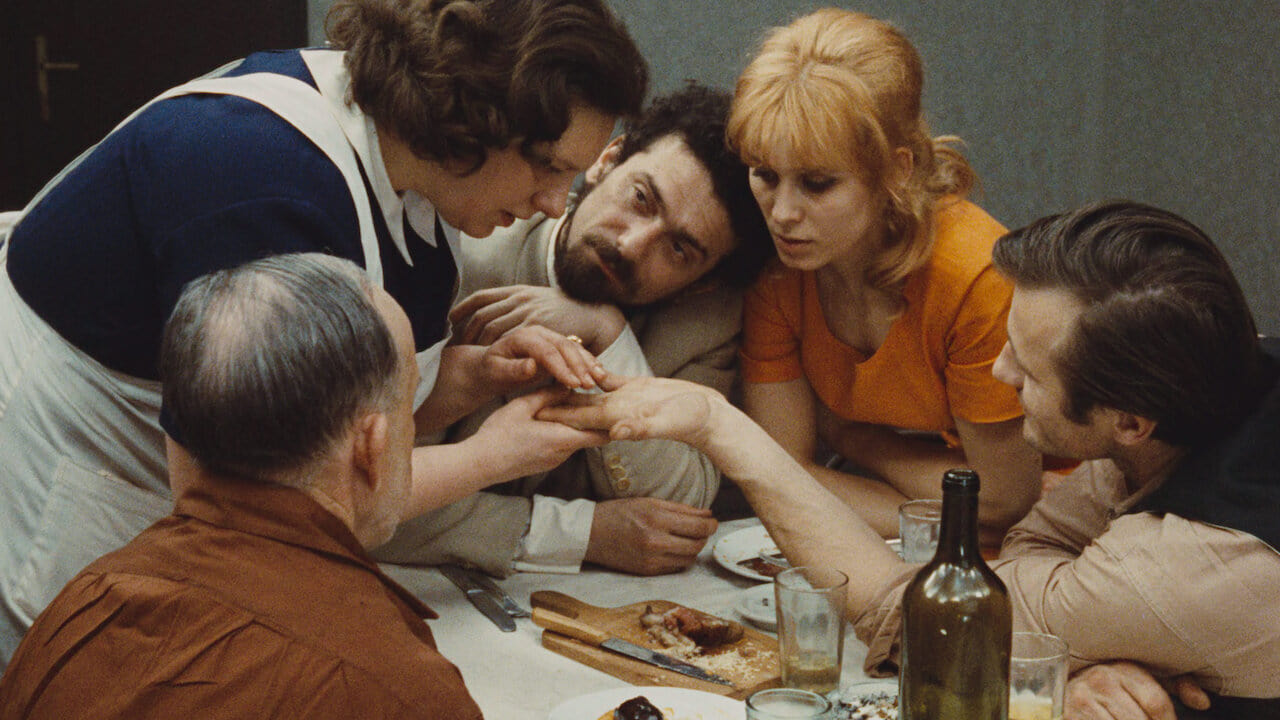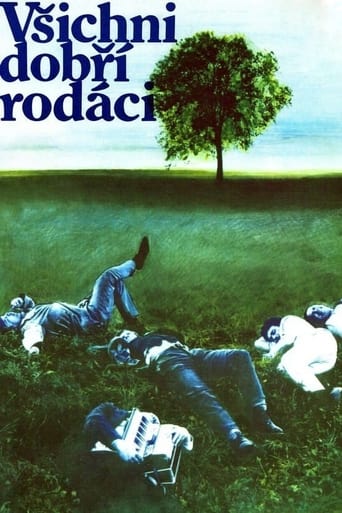SincereFinest
disgusting, overrated, pointless
Taraparain
Tells a fascinating and unsettling true story, and does so well, without pretending to have all the answers.
Lucia Ayala
It's simply great fun, a winsome film and an occasionally over-the-top luxury fantasy that never flags.
lasttimeisaw
Possibly the most famous work of the nonagenarian Czech filmmaker Vojtech Jasný, ALL MY COMPATRIOTS is a trenchant allegory of life under the Communist regime, shot with sublime bucolic élan and fairly won him the BEST DIRECTOR honor in Cannes. Inhabited in an idyllic Moravian village, this close-knit community Jasný rounds up is particularly male-oriented, a patriarchal microcosm where the fate of ordinary lives is steered by an intangible hand. From the film's time span (1945 to 1958), inhabitants are divided by political views, tormented by past deeds, succumbed to ludicrous idiocy or outrageous hatred, united behind one good guy but also crumbled when things become menacing. Overall, Jasný manages to flesh out a vivid smorgasbord of characters living under shifting sands with none-too-heavy-handed snippets center on their objects: a four-square peasant (Brzobohatý, full of fortitude), a shifty photographer, a guilt-ridden drunkard (Matuska, strikingly entrancing), a displaced organist, a cleft-lipped thief, an ill-fated postman among others; whereas in the petticoat front, we have a running gag of a jinxed merry widow, whoever dares to court her would be pretty soon pushing up daisies. But, the film's strength and value does not reside in the circumspect plot construction, because Jasný doesn't offer a rounded inspection of the state of affairs, most of the time, audience are passive witnesses of the unjust happenings but barring from peering into the machinations behind those (Communist) persecutors and connivers (they are all schematically depicted as surly pawns), thus it manifests that Jasný's standing point might not be entirely objective, it has Jasný's autobiographic influence notwithstanding, but no more a convincing censure of the regime than a frank rumination of an existential philosophy and his unbiased view of the hoi-polloi (both affectionate and matter-of-fact). Actually what makes this film a marvel to any new audience is its ethnographic portrait of the place and its people, Jasný has an extremely keen eye on faces and lights, the portraitures he captures are magnificent to say the very least (particularly the furrowed visages of the elderly), and sonically, its nostalgic soundtrack (organ pieces, lyrical strains) and diegetic music sequences serve as excellent ballast to those indelible images, somehow, the film is sublimed itself into something might surpass even Jasný's intention, something should be enshrined as an ardent reportage of its locus and time, a deathless enterprise finds its solid toehold amongst a vastly manifold Czechoslovakian cinema.
Tom Dooley
'All my compatriots' (original title ' Vsichni dobrí rodáci') tells the story of seven friends from a small town in Czechoslovakia and we join them in 1948, they are on the wrong side of the Iron Curtain and the new Communism is thrust on this agricultural society. The seven friends are used as a vehicle to shine a light on the shortcomings of collectivisation and the corruption that seemed to be concomitant when power is used to deprive others of wealth.The story slowly distils to one of resistance albeit within the spirit of the law and that is in the shape of Frantisek. This was promptly banned by the Soviets after the 1968 invasion and sadly never had the impact it should have done and that is despite winning Best Director and the Jury Prizes at the 1969 Cannes Film Festival.It is filmed and framed very beautifully and all of the acting is of the highest calibre. It has a maudlin quality that is juxtaposed against the strength of will displayed by some of the main players. Some of the shots will stay with you too and very real people have been used to give added authenticity to the whole thing. This is a film for those who really appreciate cinema in all its glorious forms.
pocketapocketa
This may not be a good place to start to enjoy Czech film - there are more accessible New Wave films - but it is a very powerful film which should not be missed by anybody who has more than a passing familiarity with the country and its history. With actors such as Radoslav Brzobohatý, Vladimír Menšík, a young Jíří Kodet, and the ever-popular singer and actor Waldemar Matuška, the film has a first-rate cast. In Jaroslav Kučera, it had a great cinematographer. Jasný was by now an accomplished screenwriter and, the countryside of the Pardubice region was as beautiful a backdrop as the machinations of the early communist period and, in particularly, the collectivisation of agriculture, were a fascinating subject. Still, the excellence of the film was not a given. The structure, given in large part by alternating dramatic changes of the environment as the seasons change and those first years after the communist takeover roll on, is effective and well-paced and permits a continuity of tone and subject with certain more episodic elements. The plot, on the page, might come across as busy, but on the screen, there is plenty of breathing space, and room for exquisite shots of the countryside, of work, even of play. So too does the heroic refusal to compromise of one of the characters, František, which becomes of increasing importance as the film moves into the mid 1950s, do nothing to detract from the well-balanced portrayal of the various characters of the village, described and referred to by their silly nicknames from the opening scenes in the months after the war. The history and fates of these characters are handled deftly, often with a brevity and telling detail of a John Cheever story. Neither is the film as unremittingly brutal as others handling similar material, such as the excellent, and thematically similar Smuteční slavnost of the following year. Like that film, I hope to return to Všichni dobří rodáci many times yet, and am sure it will repay repeated viewing.
Spuzzlightyear
'All My Good Countrymen' is a curious little Czech movie that tells how a small village fell into Communism.A small little blip of a town suddenly has a pro-communism group banging their fists on the table demanding that farmers give up their land for a new farming policy that is more in line with party policy. The villagers not surprisingly, are dead set against it. The village then goes through almost a cycle of mysterious arrests of townspeople who are anti-Communism, trying to pressure the farmers to sign a commie card, and the very curiously high mortality rate of the Party members, I actually liked the variety of characters in this movie, and their interactions with each other. The big problem I have with this movie is it's lethargic pacing. The film just crawls and crawls to its conclusion, which is sort of well, anti-climatic.

